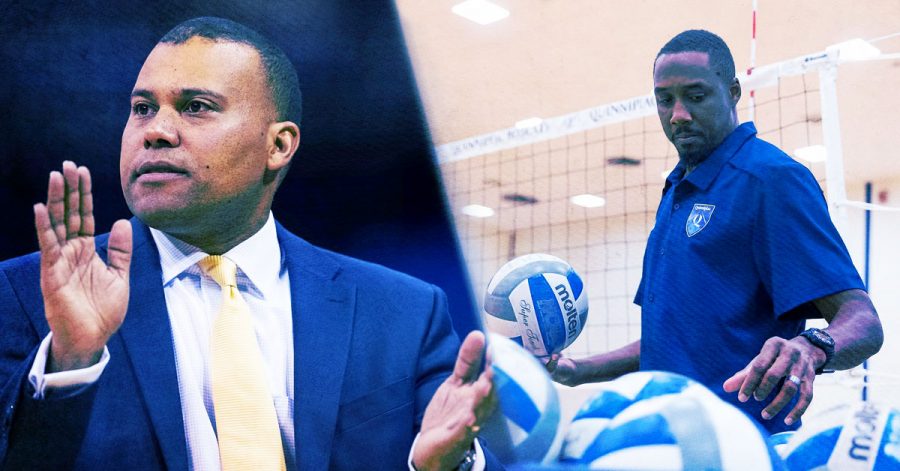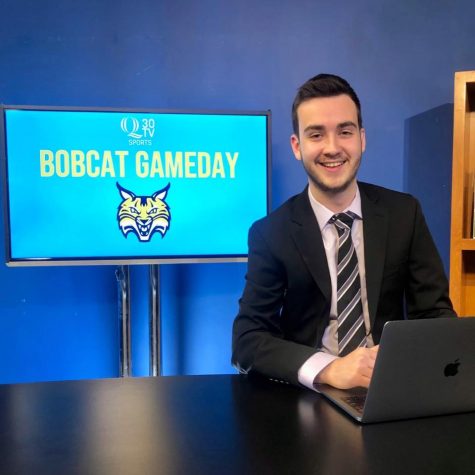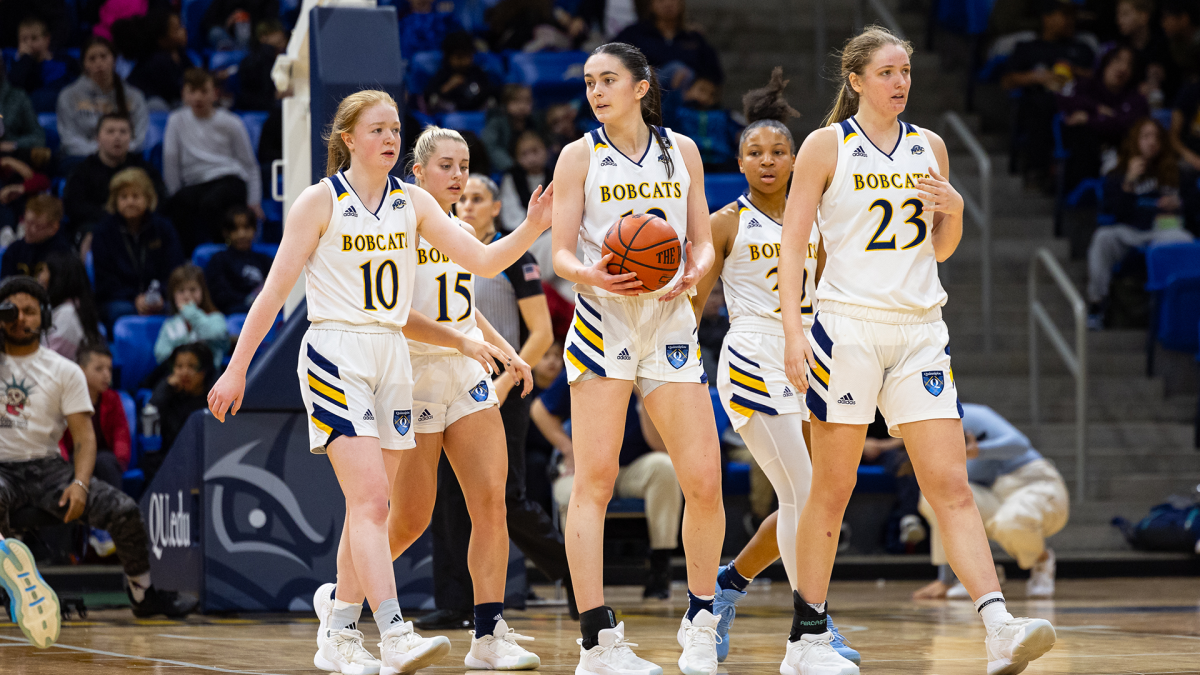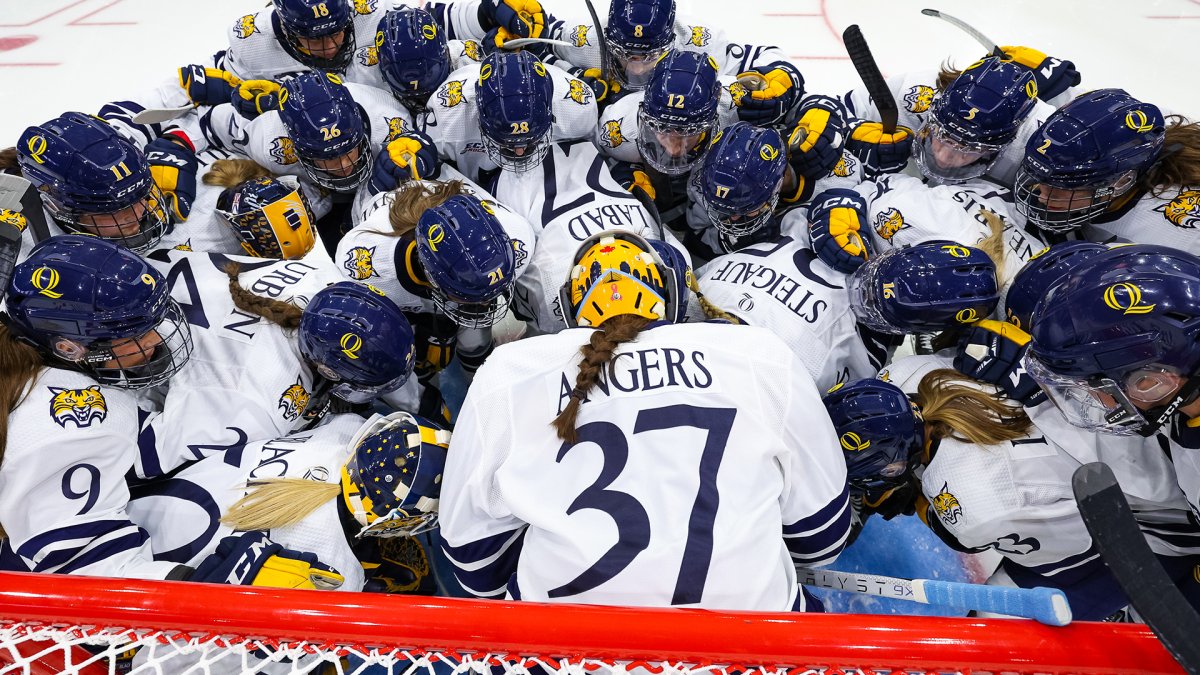“Fight the good fights,” Quinnipiac coaches speak on #BlackLivesMatter
June 20, 2020
Follow @Jacob_Resnick
Follow @Q30Sports
In a world where we have answers to the most complex or mundane questions at our fingertips, it is distressing when ones that affect the fundamental building blocks of our society, like basic human rights, appear unsolvable.
For instance, why does the systematic oppression of black Americans and police brutality still exist?
“I hear everyone saying ‘we’ve got to change the system, we’ve got to change the system.’ But what does that mean? What does that actually look like? How do we go about that?”
Brian Wilson’s initial reaction to the video of George Floyd’s murder under the knee of a Minneapolis police officer on May 25 evoked feelings of fear and disgust. But as a black man whose country has consistently subordinated people who look like him over hundreds of years, none of it was particularly surprising.
“Anyone who has a conscience, you’re outraged, and you’re dumbfounded,” Wilson told Q30 Sports. “How can this continue to happen in the United States of America in 2020? It just doesn’t seem real. But then you look back and over the course of history, and there have been a lot of things that just really haven’t changed.”
Wilson, an assistant coach for the Quinnipiac women’s basketball team, has been uniquely cognizant of that history. He studied the subject as an undergraduate at the University of Virginia in Charlottesville, a prominent city with a controversial record when it comes to race.
“[UVA founder] Thomas Jefferson lived a really hypocritical life in a lot of ways,” Wilson said. “I mean, he penned the Declaration of Independence and also was a slave owner. The University of Virginia was built on the back of slave labor.
“Jefferson was our third president, and he was a slave owner. He championed human rights, but not the human rights of my people. It’s just all — none of it is simple.”
What is simple in Wilson’s life, however, is basketball. So, when his team gathered to talk through the difficulties that many of them are navigating right now, there was a needed sense of normalcy — even if the conversations were being held virtually.
“It stinks that it’s happening during the quarantine where we’re not physically with one another so you can’t sit down and put your arm around someone and have that conversation,” Wilson said. “It’s not an easy conversation and it’s not an easy time, but we don’t want to pretend like it’s not there and like it doesn’t affect anyone.”
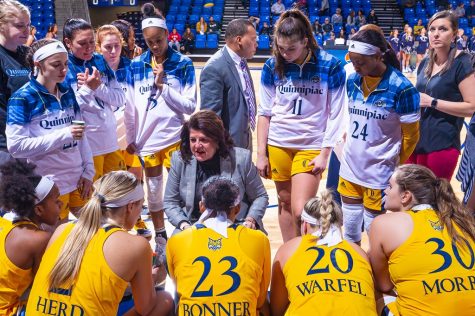
The spearhead behind both the group and individual meetings was head coach Tricia Fabbri, who released a statement last week to condemn racial discrimination.
Black Lives Matter pic.twitter.com/GiDVQ62ejs
— Coach Fabbri (@QU_CoachFabbri) June 3, 2020
“At Quinnipiac, my staff and I have always sought to be a team committed to excellence both on and off the court and we hope to use these recent tragedies to examine the way we look at the issues of discrimination and hate within our daily lives,” Fabbri wrote.
Wilson has known Fabbri since he coached at Connecticut College over the past decade, and has worked on her staff since 2018.
“It’s refreshing that I can go to work every day and just be a basketball coach,” Wilson said. “I think that is part of Tricia’s leadership. She doesn’t treat me any different than the white guy who worked here before me, and if I mess up, I’m going to hear about and if I do something well, I’m going to hear about it.
“That is really consistent across the board on our staff.”
There is no avoiding the fact that Fabbri’s staff is significantly more diverse than what is seen across other athletic teams at Quinnipiac. Wilson and fellow women’s basketball assistants Destini Hughes-Santos and Jen Fay represent half of the coaches of color on campus.
In fact, women’s volleyball head coach Kyle Robinson is only the third African-American head coach to hold such a position at Quinnipiac since the 1980s, following Fabbri’s predecessor, Bill Dixon (1986-1995), and the school’s first volleyball head coach at the Division I level, Makeba Davis (2000-2005).
All of the administrative positions within the university’s athletic department are filled by Caucasians.
Robinson came to Quinnipiac in 2019 after coaching stops at the Air Force Academy, LIU Brooklyn, and Oklahoma. His professional playing career took him to Puerto Rico, Greece, and Belgium, among other international locations.
But it all started for Robinson in North Philadelphia — West Oak Lane, to be exact. And of the many things his hometown provided him with, a first-hand viewing of how people who look like him are treated in this country is certainly one.
“It’s just a different type of world you live in where what’s constantly placed in front of you is oppression, strife, stress, and struggle,” Robinson told Q30 Sports. “A lot of people don’t make it out. The outlook that you get on the world is just different than maybe in another place.”
The guidance of the two most prominent voices in Robinson’s life, his parents, allowed him to navigate through the noise. Even though he grew up around virtually no diversity, racial acceptance and tolerance was simply ingrained in him.
“It was never the mentality of ‘white versus black’ or ‘you versus someone else,’” Robinson said. “The content of one’s character is what was important.”
Though others around him may have cherished the opportunity to, basically, stick it to white people, the mantra of doing the right thing never failed to guide him. Robinson recalls a group of friends throwing snowballs at cars as they drove to and from the adjacent, more affluent town of Cheltenham, but making up excuses to remove himself from the situation.
“It never was right to me,” he said. “Even though I grew up in a hood of 99.9 percent black people, it never was the right thing — and still isn’t the right thing — to have animosity towards a person simply because of their skin color. And obviously we’re seeing that now.”
“That” includes the repeated examples of police brutality and racial injustice towards black Americans, including the murders of Floyd, Ahmaud Arbery, and Breonna Taylor that have sparked massive, worldwide #BlackLivesMatter protests over the past two weeks.
“[The Floyd murder] is I think indicative of people being able to see it on a global scale now, and they have just had enough,” Robinson said. “They are just tired of this kind of thing happening because there is no positive outcome. The emotions go high for a few weeks, there is a lot of talk, leaders get together, and then it dies down. There is not any real change because a month later something else is going to happen.
“It’s just… come on, guy. [Floyd’s killer’s] buddy is standing around and everyone is just watching. I think that might even make it so much worse because now you have three other [officers] who seem to be just standing around and going like, ‘that’s alright, dude.’ Someone needs to have the courage. Someone needs to stop being so cowardly that you can’t give up for a moment and just stand up for what’s right. Stand for another human’s life. Right or wrong, whatever this guy may have done, I think there are very few things in life where a person deserved that.”
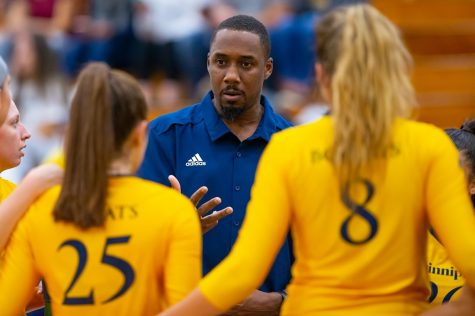
Robinson, like Fabbri and Wilson and other coaches at Quinnipiac, talked with his team last week. The impetus for the volleyball meeting was a message he received from a close friend a couple of days prior, expressing feelings of inadequacy in these trying times.
“I wanted to make sure that I didn’t get a message like that from one of them,” Robinson said of the team he took to the MAAC championship game last November. “That would have crushed me. Talk about emotional, I’m a crier for sure. I wanted them to realize that they all have been and are good people who had done more than enough to make sure the relationships with their teammates and myself are on a very high level when it comes to social issues.
“Part of being a good teacher is just being real with them, include them in the things that are the most difficult. The easy stuff is easy for a reason, but these things that are most difficult, a lot of people will duck away from it. And I was choosing not to.”
Robinson also offered advice to his team on how they, and others, can begin to eradicate the institutionalized oppression of minorities in this country.
“We have to stop giving people a pass and allowing little microaggressions to be acceptable,” he said. “Let’s see if we can attack the micro things and not let them fester and grow to macro things.
“I think for so many people, it just feels like no one is fighting for them. They have no hope. We’re feeling it right now on a different level when it comes to the coronavirus, that we might not go back to school or we might be stuck inside for another year like this.
Now imagine centuries of feeling that oppression. Growing up as now a 46-year-old man, it weighs on you. So, what I say is fight the good fights.”


